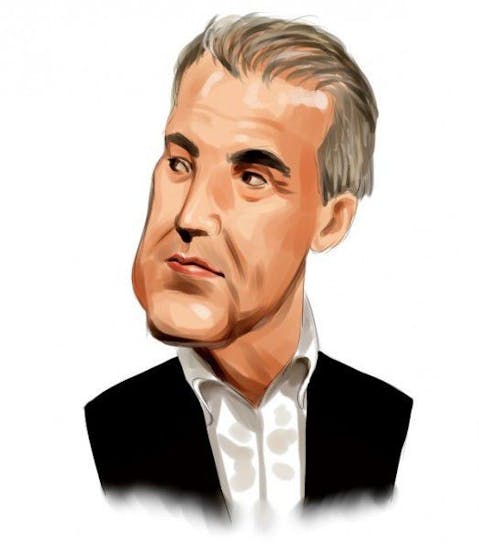Marc Lasry of Avenue Capital said in an interview with Bloomberg that the U.S is still the best place to invest in. Lasry, who according to Forbes has a fortune of $1.9 billion, also tackled the issue of activist investors, the bond market and its estimates of when the U.S. Federal Reserve will increase interest rates, what providing more stimulus may mean to the U.S economy, the commodity market’s downtrend and its effect on corporate debt in emerging markets, and higher capital requirements for insurers

Professional investors like Marc Lasry spend considerable time and money conducting due diligence on each company they invest in, which makes them the perfect investors to emulate. However, while their returns have been strong the past two years, we also know that the returns of hedge funds on the whole have not been good for several years, underperforming the market. We analyzed the historical stock picks of these investors and our research revealed that the small-cap picks of these funds performed far better than their large-cap picks, which is where most of their money is invested and why their performances as a whole have been poor. A portfolio of the 15 most popular small-cap stocks among funds outperformed the S&P500 Total Return Index by 95 basis points per month between 1999 and 2012 in backtesting. The exceptional results of this strategy got even better in forward testing after the strategy went live at the end of August 2012. A portfolio consisting of the 15 most popular small-cap stock picks among the funds we track has returned 118% and beaten the market by more than 60 percentage points since then (see the details).
Lasry co-founded Avenue Capital in 1995 with Sonia Gardner. The firm has about $13.9 billion in assets under management as of the end of July. By the end of June, the company had approximately $918 million invested in the U.S public equity markets. Avenue Capital is admittedly a distress player, as Lasry points out in the Bloomberg discussion, with his firm focusing on distressed and undervalued debt and equity.
Follow Marc Lasry's Avenue Capital
In the interview, Lasry pointed out that if he were an equity investor, he would be investing in the U.S. The country’s economy, he stressed, is doing great and has so few issues compared to the rest of the world. But since his firm is a distress player, it is investing in Europe, in Asia, and in other areas where there are problems, he said. What everybody is too focused on is the rate at which the economy is growing, he explained, and what happens is everyone is happy to raise rates if economic growth is at 3%-to-4%, but people get nervous when growth is at 1% or 2%. This is why there is pressure to have the government continue to stimulate the economy, he said. He suggested that perhaps the normal for the U.S now is a growth of 1%-to-2%.
Lasry mentioned in the interview that the idea that the Fed will provide more stimulus to the economy would be the “worst thing in the world” because the market has been living off of these low interest rates. What is needed is more normalcy, he argued, with the understanding that the Fed cannot sustain pumping more and more stimulus into the economy. The economy needs to be left to its own to grow and do what it needs to do, he added.
As for the bond market’s speculations on when the Fed will raise interest rates, Lasry told Bloomberg that he does not spend any effort timing the Fed hike. Bloomberg’s Stephanie Ruhle said that after the weak jobs report on Friday, bond traders expect the Fed to wait until at least March to raise its benchmark rate from zero. Another hike is expected into early 2017, she added.
Lasry was also shown a projection of what the Fed thinks interest rates will be through 2017 and what the market expects. The market expects slower growth and virtually non-existent inflation. Lasry says he trusts the market’s projection more, because the Fed is viewed as having been more reactive than proactive. Low rates have been in place for the past four-to-five years, he said, and it’s just a matter before those rates will be raised, not a matter of whether the rates will be raised.
With the downturn in the commodity markets raising the risk of emerging-market companies defaulting on dollar-denominated debt, Lasry said that he does not expect a repeat of the market rout in 2008 as financial institutions are very liquid and have robust capital reserves. There will, however, be companies in trouble, he said.
Erik Schatzker then discussed with Lasry reports that insurers, according to documents released in Europe, will be facing higher capital requirements. He said the development means that insurance companies will be pushed to buying riskier investments to deliver expected returns and meet all obligations. This means that in order to hold more equity capital and buy safe treasuries, the rest of insurer’s capital will have to be substantially more risky.
In the interview, Lasry also touched on Nelson Peltz’s Trian Partners disclosing a $2.51 billion stake in General Electric Company (NYSE:GE). Trian Partners may have just recently won another battle with E I Du Pont De Nemours And Co (NYSE:DD) as its CEO and chairwoman Ellen Kullman will be stepping down on October 16. Given that Peltz is an activist, it is expected that he will pressure General Electric into unlocking value, cutting costs, being more cautious in acquisitions and returning more shareholder money. In fact, Trian says that it wants GE to take on about $20 billion in additional debt to buy back shares. Lasry, however, says that companies like GE should be appreciative of new investors but be less fearful of activists and less receptive to their demands. At the end of the day, the Avenue Capital co-founder said that activists need to convince other large shareholders that they are right. In the case of Trian, though it is one of the top ten shareholders of GE, it still holds just 1% of the company’s shares.
At the end of the second quarter, Avenue Capital’s top three stock picks were Houghton Mifflin Harcourt Co (NASDAQ:HMHC), Gener8 Maritime Inc (NYSE:GNRT) and Meritor Inc (NYSE:MTOR). Avenue Capital owned 4.74 million shares of Houghton Mifflin Harcourt by the end of June, while it owned 7.21 million shares each of Gener8 Maritime and Meritor.
Disclosure: None



